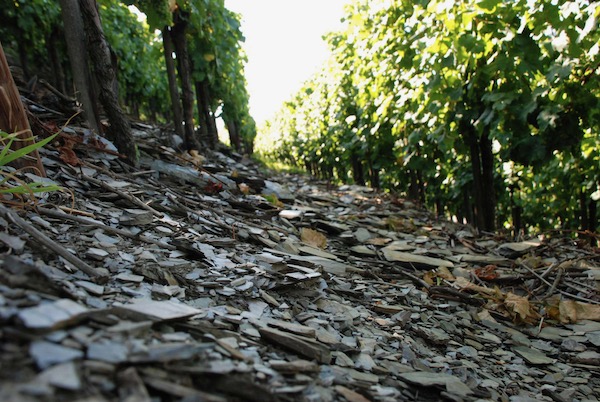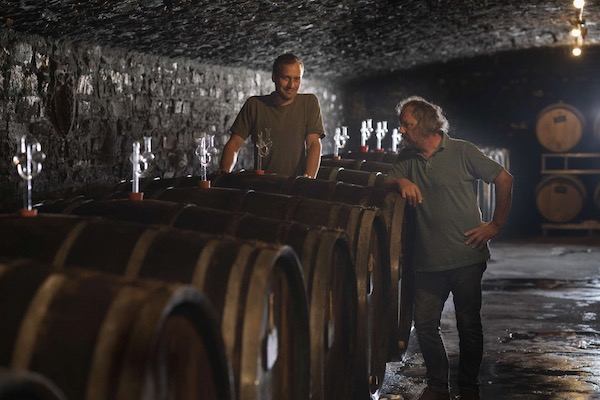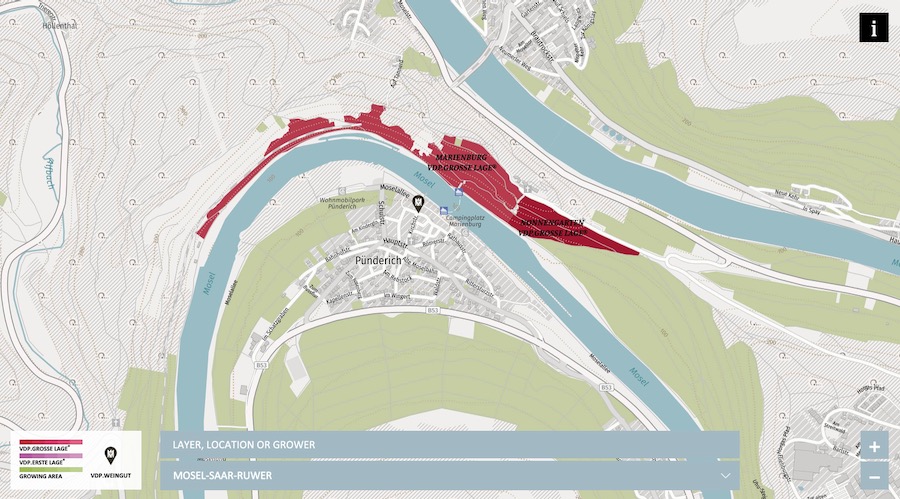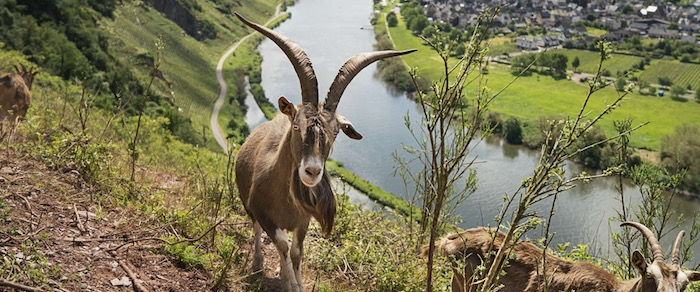This is a pre-arrival offer. Wines are due between August and October as noted below.
I had the incredible pleasure of meeting Clemens Busch just prior to the 2020 pandemic hitting Australia. Tasting with him and listening to his carefully thought out responses to my typically probing questions was exhilarating. We may have been in a pokie, slightly stuffy room, his wines still transported me to another place.
A maker of mostly dry wines in the Mosel is not common. Historically those I have tried, even at GG level, have generally lacked that something special, the spark that takes you from solid to stunning.
I’ve often thought it to be in the élévage, the wines have been too raw, unfinished, lacking harmony.
Clemens wines were a revelation! Crystalline & translucent with incredible depth and length, elegance and refinement, yet wines of substance of flavour and texture. Sophisticated, yet, worldly.
They are a wonderful contrast to the richer styles from regions like the Rheinhessen, once again showing the diversity of styles Riesling offers.
The personable family produces mainly Riesling with the main focus on expressive, full-bodied, dry or medium-dry grands crus harvested as late as mid-November and characterised by their depth, density, concentration and complex (merciless) minerality”
Stephan Rheinhardt, The Finest Wines of Germany

About Clemens Busch
Clemens started working in his father’s 2-hectare estate in 1975. He stopped using herbicides in 1976, then in 1984 he and wife Rita converted to organics. They were among the first in Germany to begin consciously growing grapes this way and they became instrumental in the movement establishing an association of organic growers in 1986. While farming organically they began using various preparations from the biodynamic toolkit, finally converting entirely in 2005. Today Clemens is recognised as pioneer of both the organic and biodynamic winegrowing movements in Germany and has mentored many other young growers, including his son Florian who now works with him and Rita.
Since Clemens and Rita assumed responsibility of the estate it has grown significantly and now comprises 18 hectares. 16 of those are on the ‘First Growth’ Marienburg vineyard that rises steeply from the Mosel, opposite the town of Pünderich. Vine age ranges from 35 to over 100 years, the single site Grosses-Gewächs (GG) range is produced exclusively from vines older than 65 years. The Marienburg vineyard comprises all three types of Mosel slate – red, blue and grey – and several unique parcels within the vineyard. This allows them to make a large range of distinctively different, site-driven Rieslings which are distinguished using the traditional names of the parcels. These names were largely abandoned in the ‘70s after the new German Wine Laws brought in the über-vineyard name of Marienburg. Thanks to the clear-cut differences between the individual sites; the wines are a great exercise in the transparency of Riesling, especially for the dry cuvees.
The estate is unique among its middle-Mosel peers as it produces around 80-90% dry wines, although many are now following Clemens’ lead. The traditional production methods are thoughtfully adjusted according to the vintage and include late harvesting, maceration before pressing, long slow natural ferments and extended lees aging in ancient 1000l fuders (the youngest of which is 57 years old!). The wines are unfined and unfiltered with small doses of sulphur just before bottling. All this ensures that these are among the richest, most concentrated, textural dry Rieslings produced in the Mosel today. They retain great purity, striking acidity, deeply concentrated fruit, with nervosity and off-the-chart minerality.
In the Vineyard
Before you can work the vineyard, first you must become a skilled mountain climber! Everything here is done by hand!
In the Winery
It’s all pretty simple. Grow good fruit. Nudge it here or there during the making process. Pay attention to the details and get it into bottle in one piece! Large old oak, wild ferments, and a touch of sulphur at the right time. Job done. It’s as hard as that.

The 2019 Vintage at Clemens Busch
What proves remarkable about 2019 is that it produced stunning wines, many of which we rated with near-perfect or perfect scores, in all stylistic directions. The dry wines are precise, alluring, and focused at their best. The best off-dry wines playful, transparent, and elegant. 2019 yielded the finest set of Kabinett wines, this almost unique specialty of the Mosel, in many years. Also, the finest Spätlese have a precision and elegance not found here possibly since the 1990s. Finally, the greatest noble-sweet wines can only elicit a huge smile of lovers of the genre. A few wines even proved sheer perfection and several are on the best way to achieve this at maturity.
The universality of the 2019 vintage is best underlined by the huge number of Estates that were able to land highlights in ALL stylistic directions, from dry to noble-sweet. In 2019, A.J. Adam, Clemens Busch, Falkenstein, Fritz Haag, Loersch, Carl Loewen, Maximin Grünhaus, Max Ferd. Richter, Günther Steinmetz, and Weiser-Künstler all managed this tour de force.
Two Estates however managed to combine this universality with a great number of highlights as well as crafting some wine perfection: Fritz Haag and Clemens Busch. Both Estates outdid themselves in this vintage and are true highlight Estates of the vintage!
The finest wines, all modern-day classics in making come from A. J. Adam, Clemens Busch (whose yet to be released 2019er Pündericher Marienberg Fahrlay GG is the dry Riesling of the vintage), Fritz Haag, Schloss Lieser, and Selbach-Oster. Most usual suspects did also deliver handsomely.
Where in the World is Clemens Busch?
Clemens Busch is in the middle-Mosel with the majority of his production coming from the Pündericher Marienburg vineyards.
The German VDP has an excellent interactive map covering the wine-growing regions of Germany. Click on the Map to go to the live version. For context, Pünderich is much further north up the Mosel from the vineyards of Whelen and Graach.

About the Wines
Single Slate Wines - due August
Riesling Vom Grauen Schiefer
AP: 27 20. The 2019er Riesling vom grauen Schiefer, as it is referred to on the main part of the label, comes from grey-slate sectors in the Pündericher Marienburg. It offers a subtly backward nose made of pear, aniseed herbs, bergamot, ginger, floral elements, wet stone, and smoke. The wine is nicely firm and precise on the fully spicy and zest-infused palate and leaves a long and mouthwatering feel in the tart finish. The after-taste is animating and hugely engaging. This superb dry Riesling in the making will give many high-end (GG) bottlings more than a run for their money 2021-2031
Riesling Vom Roten Schiefer
AP: 28 20. The 2019er Riesling vom roten Schiefer, as it is referred to on the main part of the label, comes from iron-rich sectors of the Pündericher Nonnengarten and Pündericher Marienburg. It offers a subtle and complex nose made of mirabelle, cardamom, white peach, floral elements, smoke, and herbs. The wine is packed with flavors and delivers an intense but finely chiseled impact on the palate. It leaves one with a sense of intense smoky spiciness in the long, lingering, and smooth finish. A refined kick of zest adds to the immediate appeal of this gorgeous dry Riesling. Now-2029
Riesling Vom Blauen Schiefer
AP: 29 20. The 2019er Riesling vom blauen Schiefer, as it is referred to on the main part of the label, comes from early pickings in the blue-slate sector (Fahrlay) of the Pündericher Marienburg. It offers a gorgeously floral and subtle bouquet quickly joined by mirabelle, vineyard peach, herbs, passion fruit, and smoke. The wine is gorgeously animating on the precise and zest-infused palate and leaves a feel of orchard fruits and herbal elements in the beautifully tart finish. The after-taste is all about flowers, minerals, and fresh orchard fruits. This is a gorgeous dry Riesling in the making! 2021-2031
Grosses Gewächs - due October
Marienburg GG
AP: 30 20. The 2019er Marienburg GG, as it is referred to on the main part of the label, was fermented spontaneously in traditional oak casks. It proves still remarkably backward and does not reveal much beyond some discreet notes of smoke, almond (from reduction), wet stone, yellow fruits, a hint of mirabelle, and spices. The wine is still slightly on the sharp side at this stage, both on the palate and in the finely chiseled finish. It is only in the after-taste that the wine’s underlying juicy and fresh side makes a guest star appearance at this stage. The wine may prove slightly non-saying at this stage but make no mistake: This is a beauty in the making … if one has the patience to let it mature for 5 years and more. The potential is huge. 2024-2034
Marienburg Rothenpfad GG
AP: 31 20. The 2019er Marienburg Rothenpfad GG, as it is referred to on the main part of the label, was fermented spontaneously in traditional oak casks from fruit harvested in an iron-rich part of the Marienburg vineyard. It offers a beautiful nose made of mirabelle, grapefruit zest, a hint of passion fruit, and melon, all wrapped into a dash of whipped cream, some spices, licorice, brown sugar, and lots of smoky elements. The wine is firm, hugely intense but also somewhat unyielding at this stage on the palate but hints already at greatness to come in the marvelously spicy, zesty, and engaging finish. This is a great dry Riesling in the making. 2024-2034
Marienburg Fahrlay GG
AP: 34 20. The 2019er Marienburg Fahrlay GG, as it is referred to on the main part of the label, was fermented spontaneously in traditional oak casks with fruit harvested in a blue slate part of the Marienburg vineyard. It offers a superbly engaging nose made of cassis, grapefruit zest, citrusy fruits, ginger, elderflower, fine spices, herbs, and smoke. The wine proves gorgeously packed with racy flavors and smoke on the intensely flavored palate and leaves a superbly playful feel of whipped cream, earthy spices, and grapefruit zest in the long and subtly smoky finish. This is a stunning dry Riesling in the making! 2024-2034
Marienburg Falkenlay GG
AP: 35 20. The 2019er Marienburg Falkenlay GG, as it is referred to on the main part of the label, was fermented spontaneously in traditional oak casks from fruit harvested in a grey-slate infused part of the Marienburg vineyard. It offers a superb nose made of cassis, pear, citrusy fruits, a hint of whipped cream, licorice, minty herbs, and fine spices. The wine proves subtly creamy yet also gorgeously precise and zesty on the spice-infused palate and leaves an ample yet finely chiseled feel of orchard fruits, spices, and herbs in the long and lingering finish. Zesty elements add a sense of grip and sharpness to the after-taste at this stage. This beautiful expression of dry Riesling could well prove remarkable if it keeps its juicy and alluring side at maturity! 2024-2034
Marienburg Felsterrasen Grosses Lage
AP: 37 20. The 2019er Marienburg Felsterrassen, as it is referred to on the main part of the label, is a just off-dry wine (with 8 g/l of residual sugar) fermented spontaneously in traditional oak casks from fruit harvested late in a prime terraced part of the grey-slate Falkenlay sector and which underwent an extended maturation on its lees. It offers a slightly ripe and ample nose made of pear, wet stone, mirabelle, citrusy fruits, spices, and licorice. The wine offers a smooth and just off-dry feel of spices and herbs on the palate and leaves a hugely long and lingering sensation of zesty minerals and ripe orchard fruits in the almost tart finish. The after-taste is tart and quite nicely balanced. This beautiful just off-dry wine proves hugely animating and complex. 2024-2039
Marienburg Raffes Grosses Lage
AP: 38 20. The 2019er Marienburg Raffes, as it is referred to on the main part of the label, is a just off-dry wine (with 10 g/l of residual sugar) fermented spontaneously in traditional oak casks from late-harvested fruit in a prime terraced part of the grey-slated Falkenlay sector and which underwent an extended maturation on its lees. It offers a superbly complex nose made of pear, herbs, bergamot, whipped cream, chalky minerals, white flowers, and wet stone. The wine is subtly dry-tasting (and not fully off-dry) on the intense and delicately ample yet zesty palate and leaves a superb feel of fresh orchard fruits, wet stone, whipped cream, and herbs in the long and incredibly persistent finish. This gorgeous dry-tasting Riesling is hugely promising in a spicy and zesty style. 2024-2039
Sweet & Noble - due October
Marienburg Spätlese
AP: 12 20. The 2019er Marienburg Riesling Spätlese, as it is referred to on the main part of the consumer label, was made from fruit picked at 92° Oechsle and was fermented down to sweet levels of residual sugar. It offers a still rather restrained nose made of pear, smoke, residual scents from its spontaneous fermentation, whipped cream, spices, and smoke. The wine is subtly creamy yet comes over as finely chiseled on the playful palate and leaves a superbly racy feel of fresh orchard fruits, a hint of apricot, citrusy elements, and a subtle whiff of cream. This gorgeous Spätlese is still rather backward at this stage but will prove a cracker at maturity! 2029-2049
Marienburg Spätlese Goldkapsel
AP: 13 20. The 2019er Marienburg Riesling Spätlese, as it is referred to on the main part of the consumer label and with a golden capsule, was made from fruit picked at 102° Oechsle from a selection of partially (10%) botrytized fruit and was fermented down to noble-sweet levels of residual sugar. It offers a superbly backward nose made of vineyard peach, cassis, elderflower, some almond cream, a hint of apricot, fine spices, and smoke. The wine proves superbly delineated and focused on the comparatively light-footed palate and leaves a light and dancing feel in the hugely precise and profound finish. The after-taste is subtly honeyed, packed with fresh fruits, herbal elements, and zest. This gorgeous wine cut along the lines of a light-footed expression of Auslese GK is truly superb! 2029-2049
Marienburg Auslese
Marienburg Auslese Fahrlay HALF BOTTLE
AP: 15 20. The 2019er Marienburg Fahrlay Riesling Auslese, as it is referred to on the main part of the consumer label, was made from a selection of partially (10%) botrytized fruit picked at 108° Oechsle in this sector of the vineyard on blue slate and was fermented down to noble-sweet levels of residual sugar. It offers a beautiful nose made of pear, mirabelle, almond paste, smoke, fine spices and a hint of dried fruits. The wine is nicely zesty on the almond-infused and spicy palate and leaves a beautiful feel of honey, dried fruits, and creamy elements in the long finish. This is a gorgeous Auslese GK-styled dessert Riesling in the making. 2029-2059
Marienburg Auslese Falkenlay HALF BOTTLE
AP: 16 20. The 2019er Marienburg Falkenlay Riesling Auslese, as it is referred to on the main part of the consumer label, was made from a selection of partially (10%) botrytized fruit picked at 115° Oechsle in this sector of the vineyard on grey slate and was fermented down to noble-sweet levels of residual sugar. It offers a gorgeous nose made of mango, cassis, baked pineapple, almond cream, tea, smoke, and fine spices. The wine develops quite some impact on the palate as racy as some creamy notes honeyed almond and apricot are coated with lime zest and bergamot. It leaves one with an almost BA-styled unctuousness in the racy and structured finish. This gorgeous dessert wine combines impact with delineation! 2029-2059

You must be logged in to post a comment.